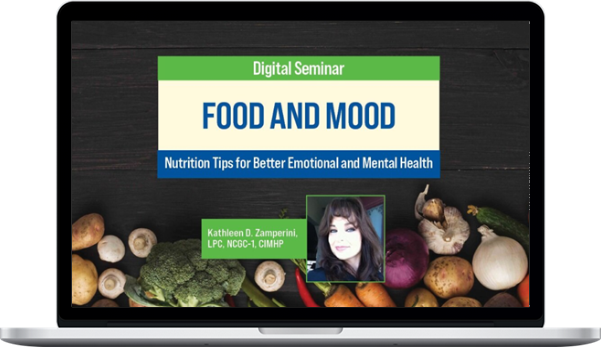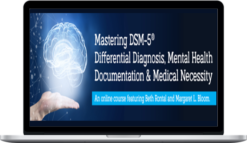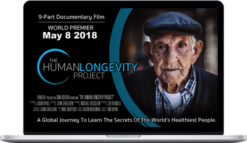Kathleen Zamperini – Food And Mood: Nutrition Tips For Better Emotional And Mental Health
$69.00 $21.00
»Delivery: Within 24hs
Description
Kathleen Zamperini – Food And Mood: Nutrition Tips For Better Emotional And Mental Health
Description Of Food And Mood: Nutrition Tips For Better Emotional And Mental Health
Nutrition is a valuable yet often missing piece of improving emotional and mental health. The average person dealing with low mood or anxiety isn’t aware of how food choices play a role in their well-being and indeed, the field of nutrition is still learning about this important area. In this recorded session, you’ll get the latest information and a concise, easy-to-understand path to supporting emotional health through simple nutrition changes. Take home effective strategies to decrease anxiety and depression and to work with clients on changing their thoughts and behaviors about food so that they achieve small goals to create lasting change.
What You’ll Learn In Food And Mood: Nutrition Tips For Better Emotional And Mental Health
Objectives:
- Assess nutritional factors that contribute to mental health conditions.
- Utilize two cognitive behavioral skills to help clients change their thoughts and improve their nutrition-related behaviors.
- Determine scope of practice issues for mental health providers discussing nutrition with clients.
Outline:
- How Food Affects MoodKeys to assessing nutritional factors that contribute to mental health conditions
The 5 substances that affect mood
Top 7 practical interventions to utilize with clients to improve mood
How to digest research on the relationship between nutrition and mental health - Foundations of Healthy EatingMental health benefits of B vitamins
Magnesium deficiency and its problems
The role of antioxidants and essential fatty acids in emotional health
Prebiotics and probiotics for gut balance - The Fork as a Tool to Improve Anxiety and DepressionConnection between stimulants, anxiety and sleep
How to talk with your clients about caffeine
Nutritional imbalances that contribute to depression
Overexposure to sugar and processed food - Your DNA is not Your DestinyCommon reasons clients have trouble moving forward
Cognitive behavioral therapy skills to assist clients in making healthy choices - Clinical ConsiderationsWhen to refer a client for more specialized care
Scope of practice issues for mental health providers - Limitations of the research and potential risks
Target Audience
- Counselors
- Marriage and Family Therapists
- Nurses
- Occupational Therapists
- Occupational Therapy Assistants
- Psychologists
- Other Mental Health Professions
About Kathleen Zamperini
Kathleen D. Zamperini, LPC, NCGC-1, CIMHP, has a master’s degree in counseling psychology and a master’s degree in education with secondary guidance certification. She is a licensed professional counselor and is a Nationally Certified Gambling Counselor. Kathleen received a degree in holistic nutrition from the Canadian School of Natural Nutrition and is a Certified Integrative Mental Health Professional. She has a passion for helping clients understand the role of nutrition in mental health.
She has 30 years of counseling experience working with persons dealing with depression and anxiety, and was previously the director of counseling for a large social service agency in Pittsburgh, PA. She has published articles in the National Gambling Association Newsletter on the role of nutrition in treating gambling addictions, and presented numerous presentations on this topic, including a statewide conference.
Speaker Disclosures:
Financial: Kathleen Zamperini was the Director of Counseling for Catholic Charities of the Diocese of Pittsburgh. She is a published author and receives royalties. Kathleen Zamperini receives a speaking honorarium and recording royalties from PESI, Inc. She has no relevant financial relationships with ineligible organizations.
Non-financial: Kathleen Zamperini has no relevant non-financial relationships.
More courses from the same author: Kathleen Zamperini
Delivery Policy
When will I receive my course?
You will receive a link to download your course immediately or within 1 to 21 days. It depends on the product you buy, so please read the short description of the product carefully before making a purchase.
How is my course delivered?
We share courses through Google Drive, so once your order is complete, you'll receive an invitation to view the course in your email.
To avoid any delay in delivery, please provide a Google mail and enter your email address correctly in the Checkout Page.
In case you submit a wrong email address, please contact us to resend the course to the correct email.
How do I check status of my order?
Please log in to HealingCourse account then go to Order Page. You will find all your orders includes number, date, status and total price.
If the status is Processing: Your course is being uploaded. Please be patient and wait for us to complete your order. If your order has multiple courses and one of them has not been updated with the download link, the status of the order is also Processing.
If the status is Completed: Your course is ready for immediate download. Click "VIEW" to view details and download the course.
Where can I find my course?
Once your order is complete, a link to download the course will automatically be sent to your email.
You can also get the download link by logging into your HealingCourse account then going to Downloads Page.
Related products
Total sold: 2
Total sold: 3
Total sold: 3









